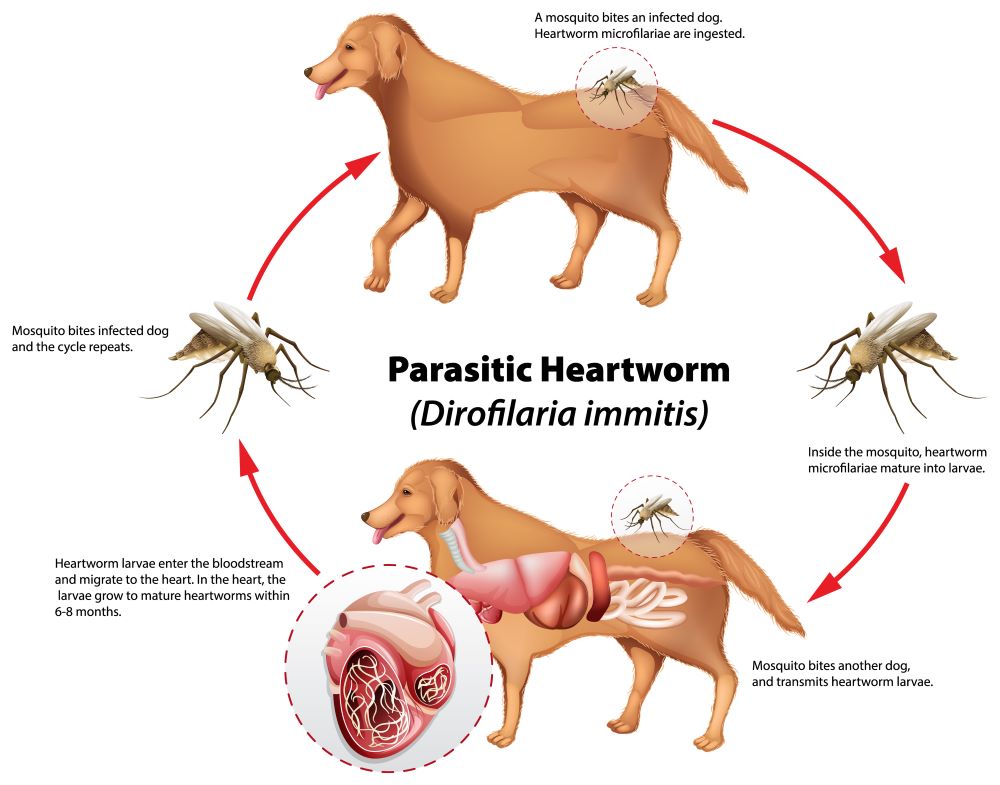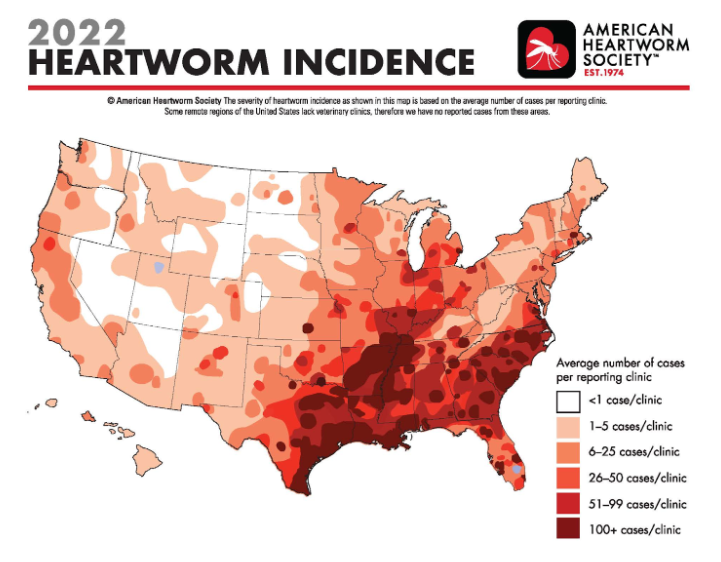Heartworm Disease: Potential Deadly Disease for Dogs
This blog was written by Dr. Richard Siegle.
With the sun shining brighter and temperatures rising, our dogs will be spending more time outdoors. It is a good time to talk about a serious mosquito-borne disease, Canine Heartworm Disease. Let’s discuss what heartworm disease is, common questions about the disease and what we can do to protect your dog from the disease.
What is Heartworm Disease?
Heartworm Disease is more than just a buzzword that you hear from your veterinarian, it is a serious illness caused by a blood-borne parasite. According to the American Heartworm Society, heartworm disease is a potentially fatal disease in dogs in the United States and many other countries in the world. The Companion Animal Parasite Council reported almost 66,000 positive heartworm cases in dogs in the United States for 2023. In the state of Michigan, over 1500 reported cases in 2023.
How Do Dogs Get Heartworm Disease?
Mosquitoes are the culprits that transmit the disease to dogs. Mosquitoes bite an infected animal (dogs, coyotes, wolves, etc.) and when they are sucking blood, mosquitoes ingest microscopic larvae called microfilaria. These baby heartworms mature in the mouthparts of the mosquito and when the mosquito bites the next dog they implant the heartworm larvae under the skin. In 4 to 6 months the larvae migrate from the skin and mature into adult worms 4 to 12 inches long within the heart and lungs of the dog.

Symptoms of Heartworm Disease
Most dogs will have heartworm disease for months before symptoms develop. Symptoms are caused by the heartworms causing a blockage within the heart, major blood vessels and lungs. Usually coughing, weakness, and exercise intolerance are the first symptoms that develop. As the disease progresses, coughing and labored breathing worsens and heart failure develops.
How is Heartworm Infection Diagnosed?
A blood test can detect if your dog has heartworm disease. We recommend the blood test once a year. The test also includes detection of tick-borne diseases. Testing should start at about 7-9 months of age.
What Happens if Your Dog Tests Positive for Heartworm Disease.
Your veterinarian will discuss treatment options and will recommend additional testing to help determine the severity of the heartworm disease prior to implementing the treatment plan. Treatment usually involves oral medication to kill the circulating heartworm larvae and injections that kill the adult heartworms.

Overall the 3-part injection has been shown to be 98% effective at killing adult worms. The more advanced the disease is and the more worms the dog has within the heart, the prognosis is less favorable. Complications can occur when dogs do not receive adequate rest after the injections because they are at risk for pulmonary embolisms, which can be fatal due to dying worms blocking blood flow to the lungs.
How to Prevent Heartworm Disease.
Since there is no way to tell if a mosquito is infected, prevention is critical. Heartworm disease can be easy to prevent in dogs, but treatment can be difficult and expensive. It is important to practice heartworm prevention year-round, especially since our weather pattern has changed over the years.
- Annual testing: Many dogs show few symptoms in the early stages of the disease. Yearly blood tests can help detect heartworm disease early and while treatment is more successful.
- Monthly oral pills kill the immature larvae before they develop into an adult heartworm. Most medications also prevent intestinal parasites and control ticks. There is also a six-month and twelve month injection that will kill the heartworm larvae, but will not control intestinal parasites and ticks.
Located in the heart of West Michigan, serving Ada, Cascade, Forest Hills, and the greater Grand Rapids area, Cascade Hospital for Animals and Breton Village Animal Clinic are trusted havens for vet care. Reach out today to schedule a comprehensive physical examination for your pet.




